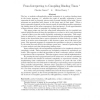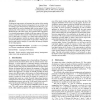37 search results - page 4 / 8 » Binding-time Analysis for Mercury |
FLOPS
2010
Springer
14 years 22 days ago
2010
Springer
Abstract. Binding-time polymorphism enables a highly flexible bindingtime analysis for offline partial evaluation. This work provides the tools to translate this flexibility into...
ESOP
1990
Springer
13 years 11 months ago
1990
Springer
The key to realistic self-applicable partial evaluation is to analyze binding times in the source program, i.e., whether the result of partially evaluating a source expression is ...
BIBE
2009
IEEE
2009
IEEE
Analysis of Autism Prevalence and Neurotoxins Using Combinatorial Fusion and Association Rule Mining
14 years 2 months ago
- The increase in autism prevalence has been the motivation for much research which has produced various theories for its causation. Genetic and environmental factors have been inv...
SENSYS
2009
ACM
14 years 2 months ago
2009
ACM
This paper describes Mercury, a wearable, wireless sensor platform for motion analysis of patients being treated for neuromotor disorders, such as Parkinson’s Disease, epilepsy,...
PPDP
2009
Springer
14 years 2 months ago
2009
Springer
Dividing the heap memory of programs into regions is the starting point of region-based memory management. In our existing work of enabling region-based memory management for Merc...



